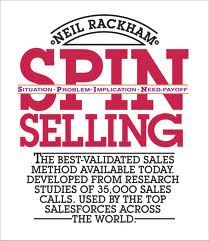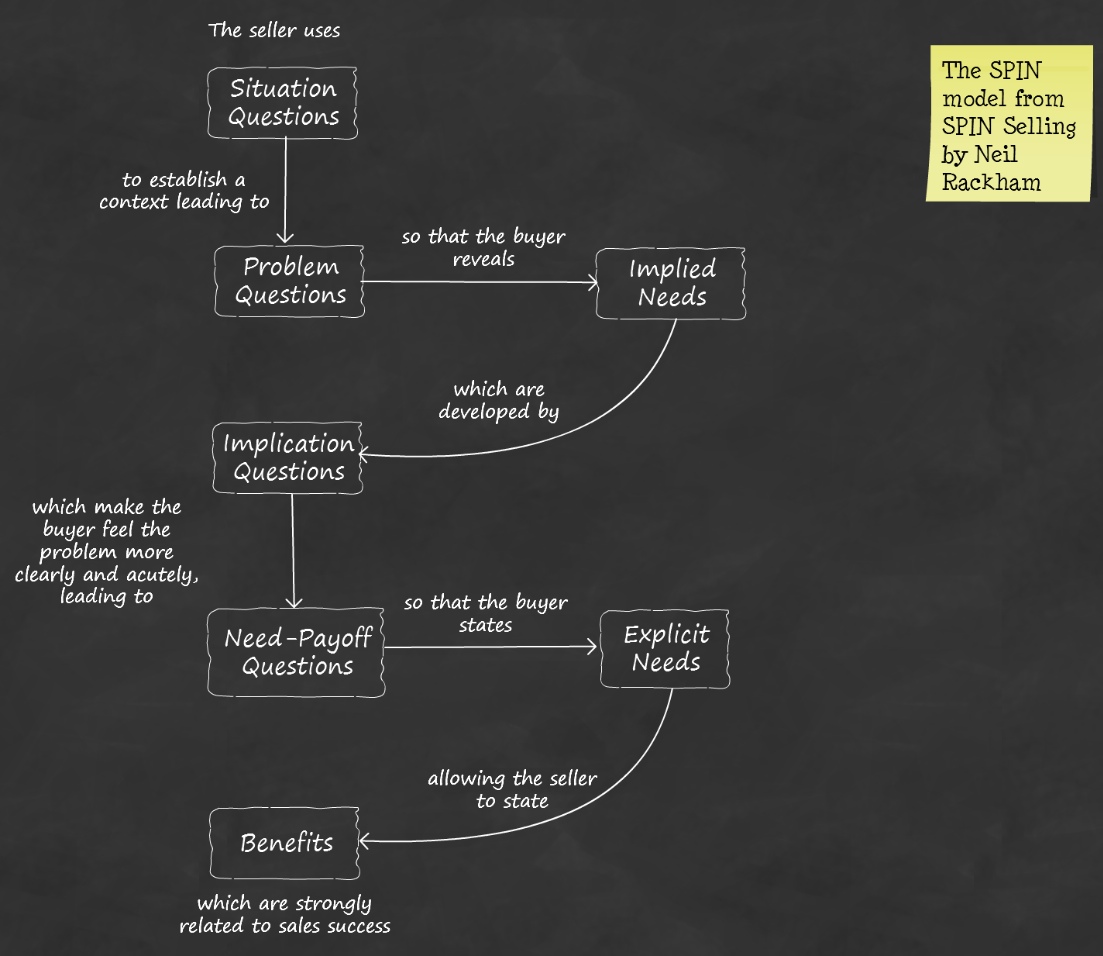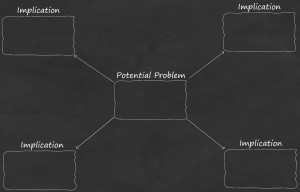 If there is one sales approach that an independent management consultant should master, my recommendation is SPIN Selling. SPIN Selling is the brainchild of Neil Rackham who wrote a book of the same name in 1988.
If there is one sales approach that an independent management consultant should master, my recommendation is SPIN Selling. SPIN Selling is the brainchild of Neil Rackham who wrote a book of the same name in 1988.
SPIN was the first approach to try and kill the perception that selling was telling. Sales methodology was (and to most still is) based on asking a few questions, then presenting a solution and then overcoming objections and preventing procrastination.
SPIN questions
SPIN is about asking questions, lots of questions and asking them within a very disciplined framework.
SPIN Selling operates with four types of questions:
- Situational questions
- Problem identification questions
- Implication questions
- Need-payoff questions
Situational Questions
 Questions about the client’s company and his current situation are situational. The answers are important for the management consultant, but not for the client. With the Internet, LinkedIn and other web based information sources we can do the basic research before we meet the client and reduce our situational questions to verification questions and questions to fill in the gaps.
Questions about the client’s company and his current situation are situational. The answers are important for the management consultant, but not for the client. With the Internet, LinkedIn and other web based information sources we can do the basic research before we meet the client and reduce our situational questions to verification questions and questions to fill in the gaps.
As a management consultant there are a few situational issues you must understand in order to win management consulting engagements and execute successfully. You must understand the ambitions of the CEO, the owner or whomever you are talking to. The ambition is the 3-5 year perspective. Does he want to prepare the company for an IPO, will he sell to an industrial player, will he grow the company to be come a leading independent player or will he prepare for private equity funding to fuel further growth?
You will not always get a straight answer, but any CEO and owner will acknowledge your interest in the ultimate objective of the company. The answers will also give the real objectives; those that any strategy and activity ultimately must support.
Problem Questions
 Most independent management consultants understand that they need to identify a problem (pain identification) before they can present a solution. Asking questions to identify problems are called Problem Questions. As soon as a problem has been identified most sales people jump to present their solution. This is what you should never do and where Neil Rackham and his SPIN selling make such a huge difference.
Most independent management consultants understand that they need to identify a problem (pain identification) before they can present a solution. Asking questions to identify problems are called Problem Questions. As soon as a problem has been identified most sales people jump to present their solution. This is what you should never do and where Neil Rackham and his SPIN selling make such a huge difference.
Implication Questions
 The professional management consultant holds his horses and probes deeper. He asks implication questions to make the client elaborate on the consequences of the problems. He asks who are affected, how much it means to the various people affected and the impact on company performance. He also asks what the consequences may be if the problem is not fixed. He asks how important this or these specific problems are related to other problems the client may face.
The professional management consultant holds his horses and probes deeper. He asks implication questions to make the client elaborate on the consequences of the problems. He asks who are affected, how much it means to the various people affected and the impact on company performance. He also asks what the consequences may be if the problem is not fixed. He asks how important this or these specific problems are related to other problems the client may face.
The trained management consultant understands that any problem must be related to the impact on the company’s performance, their competitive position, the CEO’s ambitions and job or the owner’s ambitions and wealth. The management consultant uses his questioning technique to identify the cause-effect relationship. In SPIN terminology this is called identifying the explicit needs.
In management consulting explicit needs should always be in the million USD or EUR range. Needs smaller than that are not worth fixing.
Need-Payoff Questions
 In the traditional SPIN approach the seller now gets the buyer to talk about his explicit needs related to the benefits of the seller’s “generic solution” (as he cannot possibly know the details). Getting the buyer to state the benefits has greater impact while sounding a lot less pushy.
In the traditional SPIN approach the seller now gets the buyer to talk about his explicit needs related to the benefits of the seller’s “generic solution” (as he cannot possibly know the details). Getting the buyer to state the benefits has greater impact while sounding a lot less pushy.
A management consultant doesn’t have a specific “product” to sell, but wants to win the engagement of finding potential solutions for the implicit and explicit needs. Thus, his primary objective is to ensure that the client actually decides to do something. The second objective is to get an assignment for a “preliminary insight analysis.”
The professional management consultant knows that whatever the client tells him is only one version of the situation. The professional management consultant also knows that there is nothing he can do until he learns some more. He needs insight first.

SPIN and management consulting
The beauty of using SPIN in selling management consulting is that it proves and improves your quality as a consultant. Management Consulting is 50% questions, 40% facilitation (which is also asking questions) and 10% documentation. By taking your potential client through a SPIN process you demonstrate exactly what most people are looking for in a independent management consultant: A person that first cuts through the crap identifying the root causes – and then help fix the issues.

A SPIN process requires asking many more questions than most people are comfortable with. As an independent management consultant you must learn the art of “civil interrogation”. You must be able to see eye-to-eye with your client irrespective of whether she is the person serving you in the cafeteria or she is the president of the United States of America. Respectful? – always. Submissive? – never. Only this state of mind will enable you to cut through all the fluff, reservations and ignorance your prospective clients may represent and find those huge problems that are worth solving and that you can help solve.
The simple sale
Selling consulting services as an independent management consultant is typically a “simple” sale. The “simple” sale is a sale to the decision maker, who doesn’t have to ask someone else for permission and budget. If you make sure you always deal directly with the top person (by refusing to talk to anyone else), then SPIN selling is the most direct way to important and rewarding consulting engagements.
By the end of a well-facilitated SPIN session the client will ask you if you can help him. What do you say? You say: “Let me think about it and get back to you.” Never jump in the trap and start “telling.” Ask how urgent it is? Are there any budget restrictions? Who else should be involved? Ask for a new appointment where you will present your solution.
Then you go back and consider if you can do the job, how you will do the job and how much it is worth for the client.
Acknowledgements
Thank you to Jason Yip for permission to use this black board SPIN illustrations: http://jchyip.blogspot.dk
Training and consulting on SPIN is provided by Huthwaite International

In respect that nothing sells itself – and SPIN is an excellent tool to follow a sales process, myvexperience with training in sales, shows that once you know about special psychology tools, your perceived distance to your existing or new customers is of giant value.
It is your credibility, empathy and ability to listen that gives you access to complete your questioning.
@Jørgen, thanks for your comment. Agree!